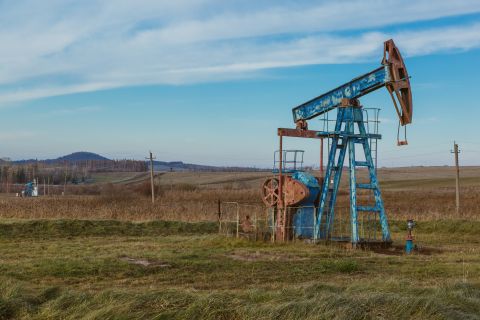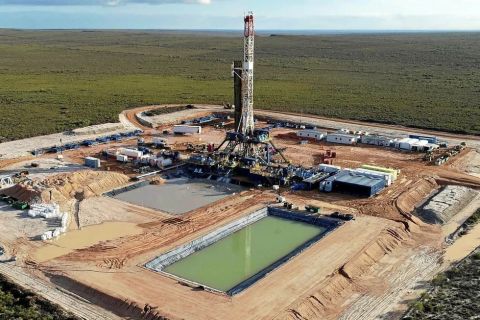I'm Jordan Blum, editorial director at Hart Energy, here at the CERAWeek by S&P Global conference, and I'm joined by Cenovus CEO Alex Pourbaix.
Jordan Blum, editorial director, Hart Energy: I just wanted to ask, y'all are heavily involved in the Pathways Alliance Partnership in Canada. Y'all are working on a big carbon capture project in Alberta. What is kind of the timeline—y’all have that evaluation agreement with the government—where do things stand?
Alex Pourbaix, president and CEO, Cenovus Energy: So you know, we've been involved in this Pathways Initiative for over two years now, and it is the sixth largest oil producers in Alberta. We represent about 95% of the heavy oil production in the province. And what we're proposing here is our initial foundational project is a pipeline and carbon capture technology to connect a number of our facilities in Northern Alberta, take them to a sequestration hub. We have been conditionally awarded that reservoir space by the Alberta government. And so that agreement really just talks about the work we're going to do to make sure that that reservoir is ultimately suitable for carbon sequestration, among other things.
JB: Very good. And just how much of an important goal is that for the company with, like you said, the government's 2050 net zero goals and everything?
AP: Well, the government has very ambitious goals to decarbonize Canadian industry. You know, this is kind of our initiative on the upstream side. And make no mistake, I mean, this ambition that they have, it is a moonshot. I mean it is incredibly challenging. The great thing about Pathways is we've been working at this for a couple of years, so we actually have a plan. We think it's achievable that we will ultimately be able to largely decarbonize the production of oil out of the oil sands by around 2050.
RELATED
Canadian Oil Producers’ ESG Strategy: Made in Canada
JB: Fantastic. Y'all are about two years into the combination with Husky Energy. Can you talk about how that integration's going, kind of the growth mode the company's in right now?
AP: Sure. You're right. We acquired Husky about just over two years ago. When I joined the company about six years ago, we had about 380,000 barrels of production upstream, and we had about 200,000 barrels a day of non-operated refining. With that Husky deal, we are now north of 800,000 barrels a day of production and north of 700,000 barrels a day of refining capacity. So it was all about pursuing an integrated strategy where we wanted to connect our molecules, our heavy oil molecules in northern Alberta with heavy oil refineries in the U.S. that were directly connected to our production and could actually process our molecules. It's been going really, really well.
JB: Great. Y'all just expanded ownership of the Toledo Refinery that came with, I think, to a 100% ownership. Is the plan to keep expanding in the U.S. from a downstream standpoint?
AP: I mean, right now…we almost have as much refining as we have production, so we don't feel the need to continue to expand our refining footprint, but we are always opportunistic and if we see a good opportunity, particularly one that was pipeline-connected to our Canadian production, we take a pretty hard look at that.
JB: You talked a little bit about the company's increase in production barrels per day, especially within the oil sands. Can you talk a little bit just about how you, not just for Cenovus, but for the oil sands as a whole, how you see that production outlook going forward, as well as takeaway issues?
AP: I think the days of the huge expansions in Alberta are done coming out of the oil sands. I think what we're going to see from this point forward are kind of organic de-bottlenecking type growth. That's where we're focused on, and we think that we can continue to have reasonable top-line growth in production for years to come. But I think you're going to see a lot more of the sort of smaller size organic growth coming out of that area.
JB: With so much going on in global demand and the war in Ukraine and everything, how does that factor into the outlook, as well as the—which hopefully will be coming online not too long—the Trans Mountain [pipeline] expansion that'll allow for much more takeaway export capacity?
AP: Well, look, I'd tell you, I mean, Canada is about the fourth largest producer of oil in the world. We have the fourth largest reserves, and not only that, we are a highly ethical producer and we're committed to reduce our carbon footprint. So we think the future should be very bright for Canadian oil going forward. And we're certainly not seeing a reduction in demand, particularly with China coming back, we're seeing pretty bullish demand numbers.
JB: Last year y'all expanded ownership of the Sunrise [Energy Project] and restarted [West] White Rose [Project]. Are those kind of the big things y'all were looking at, in terms of production, or anything else on the horizon?
AP: Yeah, those are really our big focus right now. I mean as I said, we're going to always look for opportunity to add barrels here and there, but those would be the big projects we're focused on right now.
JB: Very good. Well, now I don't want to take any more of your time. Thank you so much for joining us here. To learn more, please visit hartenergy.com.
Recommended Reading
Brett: Oil M&A Outlook is Strong, Even With Bifurcation in Valuations
2024-04-18 - Valuations across major basins are experiencing a very divergent bifurcation as value rushes back toward high-quality undeveloped properties.
Marketed: BKV Chelsea 214 Well Package in Marcellus Shale
2024-04-18 - BKV Chelsea has retained EnergyNet for the sale of a 214 non-operated well package in Bradford, Lycoming, Sullivan, Susquehanna, Tioga and Wyoming counties, Pennsylvania.
Triangle Energy, JV Set to Drill in North Perth Basin
2024-04-18 - The Booth-1 prospect is planned to be the first well in the joint venture’s —Triangle Energy, Strike Energy and New Zealand Oil and Gas — upcoming drilling campaign.
PGS, TGS Merger Clears Norwegian Authorities, UK Still Reviewing
2024-04-17 - Energy data companies PGS and TGS said their merger has received approval by Norwegian authorities and remains under review by the U.K. Competition Market Authority.
Energy Systems Group, PacificWest Solutions to Merge
2024-04-17 - Energy Systems Group and PacificWest Solutions are expanding their infrastructure and energy services offerings with the merger of the two companies.




